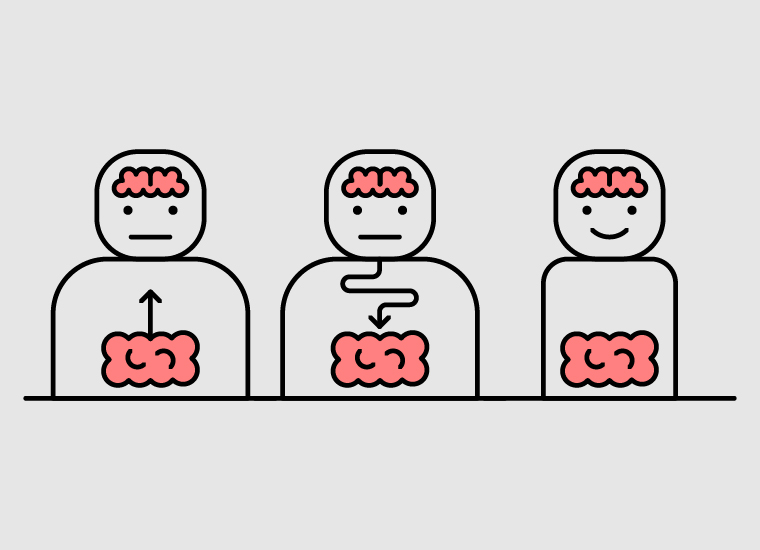
Publié il y a 1 an
11.03.2025
Partager
“Our body has evolved over millennia in an environment where food scarcity was predominant, says Lucie Favre, co-director of the CHUV Obesity Centre. To ensure our survival when food is scarce, our metabolism has learned how to optimise energy storage. So when we eat, our digestive system secretes many hormones like GLP1, which sends a message of satiety to our brain. Conversely, if we do not eat enough or reduce our food intake significantly, the feeling of hunger increases in order to encourage calorie consumption.”
In order to counteract this survival mechanism, which causes suffering in obese people, drugs with very different names have been invented in the last decade. These include Saxenda and Wegovy. They are called "GLP1 analogues" because they mimic the action of the intestinal hormone.
These treatments mark a revolutionary advance on two fronts. "It is a societal progress on the one hand," says Lucie Favre. Understanding these mechanisms highlights that obesity is not a matter of lack of willpower. To lose weight, it is not enough to move more and eat less. These patients have to fight their metabolism, which always wants to counter weight loss even if the starting weight is too high.” On the other hand, it is a great therapeutic breakthrough. “In addition to the effect of slow gastric emptying, the revolutionary effect of these drugs is on the brain. They transmit the signal that food has been eaten, calming the metabolism by making it believe that a food intake has taken place.”
These treatments also promote the release of insulin, which reduces glucose in the blood. Thus, in one year of treatment, patients experience significant weight losses: on average, 8% for Saxenda, 16% for Wegovy, and 22% with Mounjaro (the last drug authorised by Swissmedic which reproduces, besides the GLP1 hormone, the GIP hormone). Like GLP1, GIP is a gastrointestinal hormone that stimulates insulin secretion. Treatments that combine these two hormones are even more effective than those that replicate GLP1 alone.
About 12% of the Swiss population suffers from obesity. More than one in ten people in Switzerland could be eligible for these treatments. “They are intended for patients with a body mass index (BMI) of more than 35 kg/m2, or between 28-35 kg/m2 in the presence of another metabolic pathological condition.” As a reminder, a “normal” weight means a BMI between 18.5 and 25.
Health insurance reimburses Saxenda and Wegovy under strict conditions, with quantified weight targets and an endocrinologist check every six months. “The person must be fully committed, because there will be no other opportunity for a reimbursement if they do not meet the targets,” warns Lucie Favre. The medication is taken with a pre-filled injection pen. It is always coupled with healthy lifestyle measures for a healthy diet and regular physical activity, to avoid loss of muscle mass. Counselling is sometimes necessary, as in the case of Cindy Causoz.
“I got out of my toxic relationship with food”
![[Translate to Anglais:] PHOTO: GILLES WEBER](https://www.invivomagazine.ch/fileadmin/documents/images/_Dossiers/OBESITE/In_Vivo_CINDY_CAUZO_0799.jpg)
“As a child, I was slightly overweight. Around age 11, I started my first diets without much success. When I entered my teenage years, teasing at school intensified and that is when I began developing eating disorders. I would hide to eat, to find comfort in food: I went to buy cheeseburgers at fast food restaurants and I ate whole bags of chocolate balls. Fortunately, I did not have any other health problems such as diabetes or cholesterol, but the disease had a significant impact on my mental health and daily life. I gained weight until I reached 135 kg in 2021, and at that point I couldn’t take it anymore; I had to make a decision.
I had two options: either bariatric surgery or Saxenda, a GLP1 analogue. Since surgery scared me, with too fast a weight loss, I opted for the drug. However, I had to feel really ready, because once you start, you have to participate in the entire follow-up: appointments with the dietician to learn how to eat again, with the fitness coach to increase muscle mass, or with a psychologist to understand why we seek comfort in food. It’s not a miracle cure, but, coupled with all this support, it gave me an incredible boost.
In two years, I lost 30 kg. I am no longer in a toxic relationship with food. Thanks to the follow-up I received, I can redirect this need to other activities, such as going out for a walk with my dog, or painting. I rediscovered the pleasure of cooking and eating normally. If I succeeded in all this, it is also because during the first months of treatment, the feeling of reward, by eating chocolate for example, was no longer there. In addition, I had a constant sense of satiety. This reset in my brain and stomach allowed me to break more easily some old habits.
Now I take another GLP1 analogue: Wegovy. My body is gradually normalising, and I set myself achievable goals. My goal is to reduce the medication and stay at a weight that suits me. I am confident, because I now have all the tools to get there.”
L'obésité est une maladie complexe, souvent réduite à tort à une question de volonté ou de poids. Avec les bons outils et du soutien, il est possible de se reconstruire. Je ne suis plus prisonnière de la nourriture: je vis en paix avec elle, et avec moi-même.»
The other side of the coin
For the president of Eurobesitas, a French-speaking association representing the interests of obese people, GLP1 analogues are a very interesting tool, however they are not miracle solutions. “There are some contraindications, such as a history of medullary cancer of the thyroid gland or a significant psychological instability, says Dominique Durrer, also a doctor specialising in nutrition in Vevey. There are also side effects, more or less important depending on the drug, such as nausea or vomiting.” Lucie Favre also points out that 14% of patients do not respond to treatment and that diabetic patients lose significantly less weight. “Metabolic bariatric surgery is a good choice when results with drug treatments are not sufficient.”
When we talk about “miraculous” drugs, there is a risk that fatphobia increases, Dominique Durrer fears that “being fat could be even less acceptable in Switzerland. I’m afraid people will say, you just take a drug and that’s it”. The doctor from Vevey is closely following developments in the United States, where one in eight Americans has already tested a GLP1 analogue for weight loss. The country appears to be experiencing a decline in inclusiveness, according to a Courrier International article published in October. “The number of plus-size models has been halved in the catwalks and several US brands have removed XXL sizes from their stock.”
Shortage problem
Celebrities such as Elon Musk or Oprah Winfrey, but also people on social media, are raving about the benefits of GLP1 analogues to the general public. Unscrupulous doctors have prescribed Ozempic, normally used for diabetes, but also Saxenda and Wegovy to people who were neither diabetic nor obese. “Some people get them to lose extra pounds,” says Favre. “This is dangerous in many ways. On the one hand, clinical studies of these drugs have only been conducted in people with obesity or diabetes. On the other hand, taking them in the short term and without a multidisciplinary follow-up can lead to a yoyo effect.”
Number
12%
The percentage of the Swiss population suffering from obesity.
Worse still, the misuse of these drugs has led to shortages of Ozempic and Saxenda in Switzerland. “Currently, Wegovy stocks are sufficient in our country, but I spoke with an American colleague who can no longer prescribe them due to a shortage.” Because it is a chronic disease, you can’t just stop the drug overnight. Although the reimbursement is limited to three years, Lucie Favre does not recommend that her patients stop after this period. “We try to stabilise the person’s weight and then reduce the dosage of treatment to a minimum required dose. It is true that the patients then bear the cost, but this increases their chances of preventing a weight regain.”
Great hopes
In the near future, GLP1 analogues could be used to combat other diseases than diabetes or obesity. “A 20% reduction in cardiovascular risks in patients who are obese and not diabetic, as well as renal protection, has been observed, going beyond what is induced by weight loss”, says Lucie Favre.
Research is also being conducted in the field of addictions and neurodegenerative diseases. At CHUV, for example, two studies are underway in 11 people with early-stage Alzheimer’s disease. “These are two phase-three international clinical trials, each with 1,840 people, explains Olivier Rouaud, Deputy Director of the Leenaards Memory Centre. The main objective is to evaluate the effect of semaglutide (one of the GLP-1 analogues) on cognitive maintenance and autonomy after two years, then after three years. Other biomarkers of the disease are also being investigated.”
Researchers believe that GLP-1 analogues act on Alzheimer’s disease because of their ability to lower peripheral blood sugar levels and reduce inflammation. “In a clinical trial involving mice, semaglutide also improved glucose absorption in the brain, learning and memory, and reduced amyloid plaques and tau protein tangles which are both characteristics of Alzheimer’s disease.” It is a source of hope for the 150,000 people living with Alzheimer’s in Switzerland.
DRINKING SODA TO HYDRATE: A DANGEROUS HABIT
They can’t swallow water, several teenagers recently confided on TikTok, including Chloé, an 18-year-old French woman. The young woman said that she only drank soft drinks, because she thought water tasted “awful”. This form of disgust does not surprise Pedro Marques-Vidal, a specialist in clinical research at the CHUV. “As with some drugs, the regular user of soft drinks absolutely needs this taste sensation. The more sugar he consumes, the weaker his sensitivity to sugar will be, and the more intensity he will need.”
In addition to this behavioural problem of craving for sugar, the doctor points out a risk to general health. “We have enough data today to show that in adults, as well as children, there is an association between the consumption of soft drinks and the risk of obesity or even diabetes.” In view of the increase in obesity among young people in Switzerland, prevention should be much more important. “The most cost-effective and efficient thing would be to legislate. The taxation of sugary drinks has proved its worth in Mexico, in several North American counties, in Portugal, in the United Kingdom... These countries also ban soft drinks in schools. The City of London even prevents fast-food establishments from being located within 400 metres of a school.” The choice of cantons and the Confederation to favour health education campaigns is a mistake, for Pedro Marques-Vidal. “They will always be limited in time and their budget will remain incomparably smaller than that of the marketing teams of the soda giants.”



![[Translate to Anglais:] ©Large Network](https://www.invivomagazine.ch/fileadmin/_processed_/6/8/csm_LN_INVIVO_HOPITAL-FUTUR_MINIATURE_MINIATURE_337551332d.jpg)
